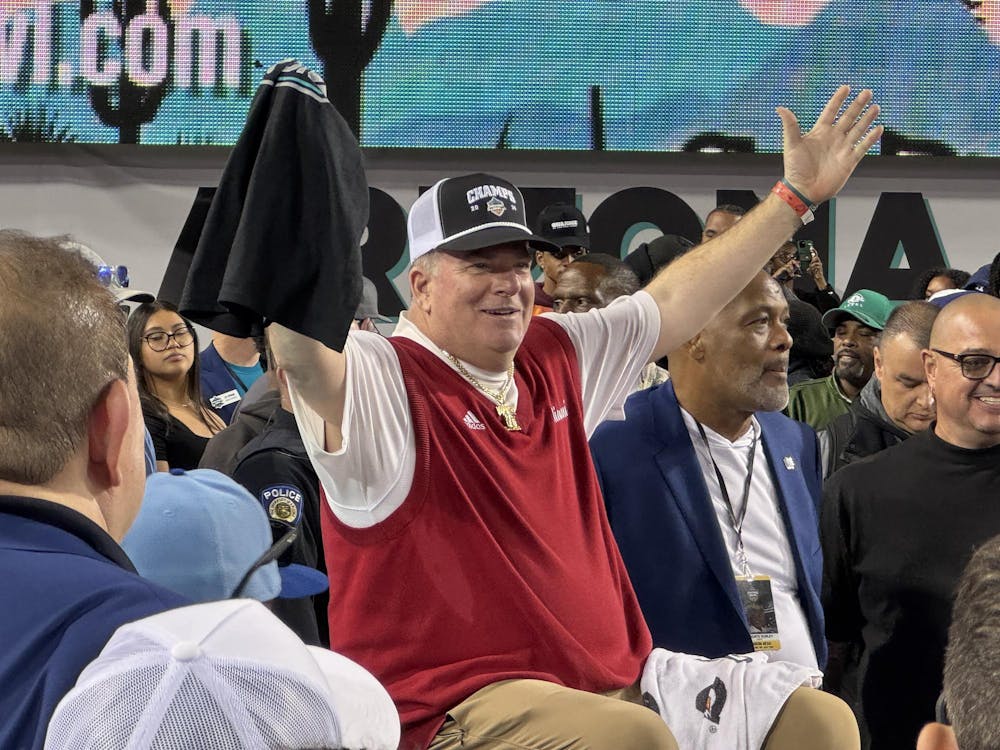For almost a decade, Hueston Woods has been home to a notable pair of birds: bald eagles.
Seven years ago, the pair of bald eagles began nesting at the 3,000 acre park. Currently, their nest is at the north end of Acton Lake, where they and four younger eagles feed on the lake's fish.
Shawn Conner, a naturalist at Hueston Woods, said that in providing for the eagles, they mostly have to be left alone. The woods' naturalists often direct visitors away from their nests or alter paths so the birds aren't disturbed.
"In the original place they built a nest, we tried to close off the trail where it was, keeping people out of the area during nesting season," Conner said. "They've since moved their nest and it's now in an area where we don't have to do as much. It's not in a place that they're going to be bothered very much."
Along with providing directly for the eagles, Conner said Miami biology professor David Russell has helped the ecosystem of the park with his work. Just recently, he and the Miami Bird Club constructed a platform for an osprey nest in the woods.
"We know we've had osprey in the park for several years, but we haven't seen them nest yet,” Russell said. “And this hopefully gives them an opportunity to do that. This might actually end up benefiting the eagles because eagles tend to be food thieves, so they might come down and try to steal from the osprey.”
Russell works with Hueston to monitor and assist the local bird population. Primarily, he bands birds, which means attaching small, numbered tags to the legs of birds to monitor their populations and return rates. He has banded more than 25,000 birds in the past 18 years. As a haven for migratory and resident birds, the woods are greatly important for multiple species of birds.
"Hueston Woods is basically an island of habitat in the middle of an ocean of agriculture," Russell said. "If you were to look at Hueston Woods from Google Earth, it would be a giant green patch in the middle of soybean and corn, and particularly to migrating birds, this is absolutely critical as a stopover site to refuel, and for resident birds, this is the trees and water and things that they need to survive."
The importance of the eagles, Russell said, is not just in the ecosystem. The eagles also serve as a symbol of wonder and hope.
"It's a bird that people recognize, it's a bird that instills awe," Russell said. "You just go, 'Wow, that's huge,' and it has a certain appeal where people go, 'Oh, yeah, I saw an eagle,' and you can talk to 15 people along the boat ramp at Hueston Woods, and they probably can't agree on any one particular topic, but every one of them would say, 'Yes, eagles are cool.'"
Eagles also represent a recent change — once on the endangered species list, the bald eagle was taken off in 2007 and is now considered to be of "least concern" by the U.S. Fish and Wildlife Service.
"The fact that you can go see eagles and that's a positive sign kind of gives you this feeling that bad things have happened in the past and we've fixed them," Russell said. "But at the same time, I'm hoping it builds an appreciation for some of the difficulties birds are being confronted with now, and we can take steps and we can solve the problem if we have both the willingness to do it and the public understand that there is a problem."
Enjoy what you're reading?
Signup for our newsletter
As the bald eagle continues to prosper, Russell hopes community members will be able to find an appreciation for nature. This appreciation, he said, can protect places like Hueston Woods and their wildlife.
"Getting people outdoors is like pulling teeth, but once they've been out a couple of times, it's relaxing," Russell said. "There are a lot of campuses in this country that don't have the natural areas around them that Miami has to get out and relax. Once you break your habit and get out for the first time, then it's fun. It's just that the first step is so hard."




